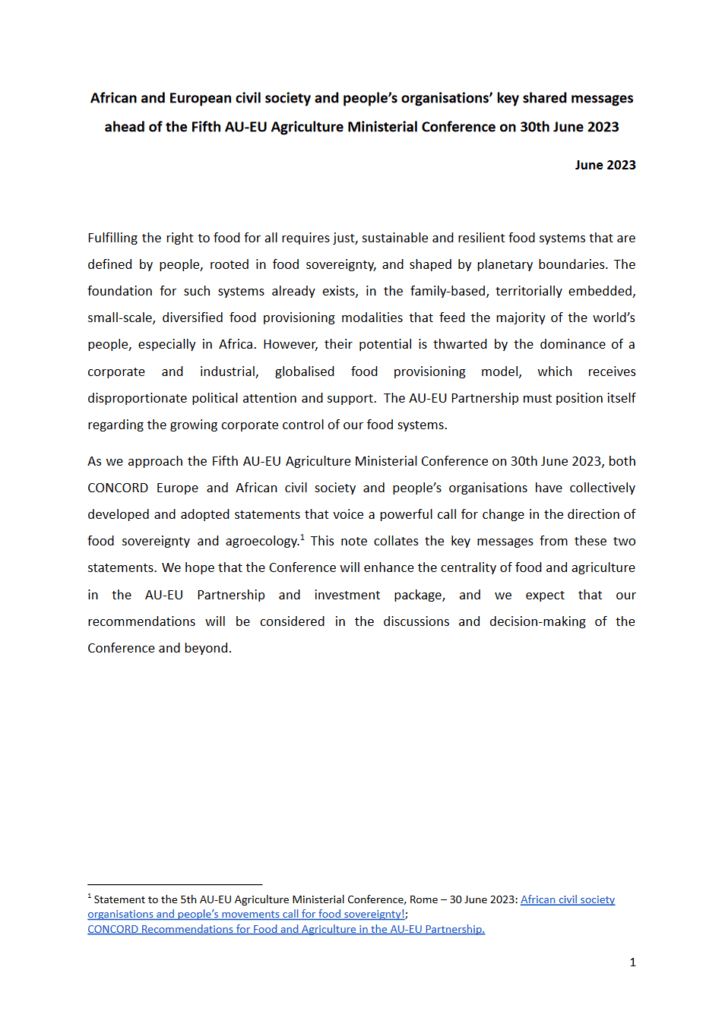Both CONCORD Europe and African civil society organisations and people’s movements have adopted statements that voice a powerful call for change in the direction of food sovereignty and agroecology. They summarised their main asks in this joint statement.
Fulfilling the right to food for all requires just, sustainable, and resilient food systems that are defined by people, rooted in food sovereignty, and shaped by planetary boundaries. The foundation for such systems already exists, in the family-based, territorially embedded, small-scale, diversified food provisioning modalities that feed the majority of the world’s people, especially in Africa. However, their potential is thwarted by the dominance of a corporate and industrial, globalised food provisioning model, which receives disproportionate political attention and support. The AU-EU Partnership must position itself regarding the growing corporate control of our food systems.
As we approach the Fifth AU-EU Agriculture Ministerial Conference on 30th June 2023, both CONCORD Europe and African civil society and people’s organisations have collectively developed and adopted statements that voice a powerful call for change in the direction of food sovereignty and agroecology. This note collates the key messages from these two statements. We hope that the Conference will enhance the centrality of food and agriculture in the AU-EU Partnership and investment package, and we expect that our recommendations will be considered in the discussions and decision-making of the Conference and beyond.
Recommendations to achieve food security and food sovereignty in Africa
Support democratic policy decision-making rooted in a human rights framework:
- AU and EU institutions should enact the proposed Civil Society mechanism for engagement with the AU-EU Partnership (which African and European CSOs have developed in follow-up to the AU-EU Summit) as soon as possible.
- The AU and the EU should defend and reinforce the role of the UN Committee on World Food Security (CFS) – the foremost inclusive intergovernmental forum addressing food issues – in improving coordination and governance of the global food system.
- The AU-EU Partnership should respect existing international frameworks to which all parties have subscribed, including the UN Decade for Family Farming (UNDFF), the UN Declaration on the Rights of Indigenous Peoples (UNDRIP), and the UN Declaration on the Rights of Peasants and Other People Working in Rural Areas (UNDROP).
Shift financing towards the agroecological transition and reduce African dependency on food imports:
- The AU-EU Partnership should seek to reduce African dependency on food imports by promoting peasant agroecological food production, rather than investing in the globalised agro-industrial development model.
- Prioritise EU investments and funding (Global Gateway, NDICI-Global Europe) for practices based on agroecological principles.
- Develop and scale-up modalities for channelling funding directly to small-scale producers through their organisations, networks, and cooperatives, including adaptation and loss and damage funding that are essential to ensure the resilience of small-scale farmers in the face of climate change. Funding should be flexible, gender-sensitive, and adapted to farmers’ needs and context.
Promote food sovereignty, peasant seed systems, territorial markets, and family farming for territorial food systems:
- Decriminalise the use of peasant seeds, farmers’ collective seed rights, and their seed systems in legal seed frameworks. Support and strengthen farmer-managed seed systems.
- Support the access to and control over land and natural resources by the hundreds of millions of Africans who rely on it, particularly women and girls; impede investments and policies that promote land and resource-grabbing.
- Develop coherent and inclusive cross-sectoral food strategies linking urban and rural areas with pertinent and adequate infrastructure, making it possible for African producers to continue to supply territorial markets and cover most of the needs of urban people and local industry with healthy and nutritious food.
- Effectively protect territorial food markets from imports that compete with and undercut local products.
- Promote public procurement policies and food reserves that privilege local agroecological sourcing to ensure healthy diets and improve women’s and small-scale food producers’ livelihoods.
- Promote regional market integration in ways that promote territorial food markets and agroecological pathways.
Phase out highly hazardous pesticides and promote bio-fertiliser production and phase out imported chemical fertilisers:
- Prohibit the production and export of pesticides and other hazardous agro-chemicals banned in the EU to the African continent, which cause devastating impacts on both human health and the environment. Instead, the EU should support a localised production of green, nature-friendly fertilisers thus, cutting dependence on chemical pesticides and fertilisers.
Promote gender equality and empowerment of women:
- Support the role of women in agriculture and food processing and marketing by promoting and securing their access to land, finance and credit, technical information, and training and decision-making over resources.
- Apply a gender lens to all food and agriculture activities and investments undertaken in the context of the AU-EU Partnership.
Ensure Policy Coherence for Sustainable Development:
- Ensure that EU policies and practices do not undermine food security in any partner countries. This applies, in particular, to the areas of debt, climate, trade, agriculture, and fishery policies and corporate due diligence.
- Lead the way in the cancellation of African debts to free up the fiscal space necessary for African governments to put adequate social protection in place and promote domestic food provisioning. The EU should lead the way in the G20 to find ways to cancel African debt and avoid adopting financing systems that increase it.
- Support the Binding Treaty on Business and Human Right to ensure corporate due diligence.
